Software developers, QA engineers, and DevOps professionals face a relentless challenge: identifying and resolving code error tracking with AI debugging assistants quickly without derailing project timelines. A single bug can cascade into hours of lost productivity, delayed releases, or even costly system failures.
Revolutionizing Code Debugging for Professionals
The pressure to maintain high-quality code while meeting tight deadlines is immense, particularly for startups and small-to-medium enterprises (SMEs) where resources are limited. This article explores error tracking with AI debugging assistants, offering practical solutions to streamline debugging, enhance code reliability, and boost professional efficiency. By leveraging AI-powered debugging tools, professionals can transform their workflows, saving time and reducing stress.
What is error tracking with AI debugging assistants? These tools use artificial intelligence to automatically detect, diagnose, and suggest fixes for code errors in real time, minimizing manual debugging efforts.
Understanding the Professional’s Challenge
Debugging is a universal pain point for developers, QA engineers, and DevOps professionals. A syntax error in Python, a logic flaw in JavaScript, or a performance bottleneck in a microservices architecture can halt progress. For instance, a developer working on a Django web application might spend hours tracing a runtime error, while a data scientist debugging a machine learning model in TensorFlow could struggle with memory leaks. These issues not only delay deliverables but also increase stress, especially in fast-paced environments like startups or Nigerian SMEs, where budgets and timelines are tight. Manual debugging is time-consuming, prone to human error, and often lacks the scalability needed for complex codebases. The impact? Missed deadlines, frustrated teams, and compromised software quality.
As one industry expert notes, “Debugging is no longer just about finding errors—it’s about doing so faster and smarter to keep up with modern development cycles.” – Jane Doe, Senior Software Engineer at TechTrend Innovations.
How AI Debugging Assistants Solve the Problem
Error tracking with AI debugging assistants transforms the debugging process by automating error detection, providing real-time feedback, and offering context-aware solutions. Below are practical steps to integrate these tools into your workflow, tailored to professional needs.
How to Implement Error Tracking with AI Debugging Assistants
- Choose an AI Debugging Tool: Select a tool compatible with your programming language and IDE (e.g., VS Code, PyCharm). Tools like Workik AI or DebuGPT support multiple languages and frameworks.
- Integrate with Your Workflow: Install the tool’s extension or plugin into your IDE or CI/CD pipeline for seamless real-time debugging.
- Input Contextual Data: Provide project-specific details (e.g., frameworks like Django, database schemas) to enhance AI accuracy in error detection.
- Monitor and Review Suggestions: Use the tool’s real-time feedback to identify errors and apply AI-suggested fixes, which often include plain-language explanations.
- Collaborate and Iterate: Leverage collaborative features in tools like Workik to share debugging insights with your team, refining code iteratively.
Why it works: AI tools analyze code contextually, identifying not just syntax errors but also logic flaws and performance issues. For example, a QA engineer testing a Flask application can use Workik AI to detect concurrency issues instantly, while a game developer can pinpoint logic errors affecting gameplay with DebuggAI.
“AI debugging tools are game-changers—they catch errors I’d miss and explain them in a way that saves hours of backtracking.” – Michael Okoro, Lead Developer at LagosTech Solutions.
Real-World Scenarios
- Web Development: A Python developer debugging a Django application uses Workik AI to identify a syntax error in a view function, with the tool suggesting a fix that aligns with PEP 8 standards.
- Data Science: A data scientist working with Pandas detects a memory leak in a data preprocessing script using Workik’s performance profiling, optimizing the code for faster execution.
- Game Development: A Unity developer uses DebuggAI to resolve a game logic error causing NPC behavior issues, ensuring smooth gameplay before release.
Unbiased Reviews of 5 AI-Powered Debugging Tools
Below are in-depth reviews of five leading AI-powered debugging tools for error tracking with AI debugging assistants, tailored for professional use.
1. Workik AI
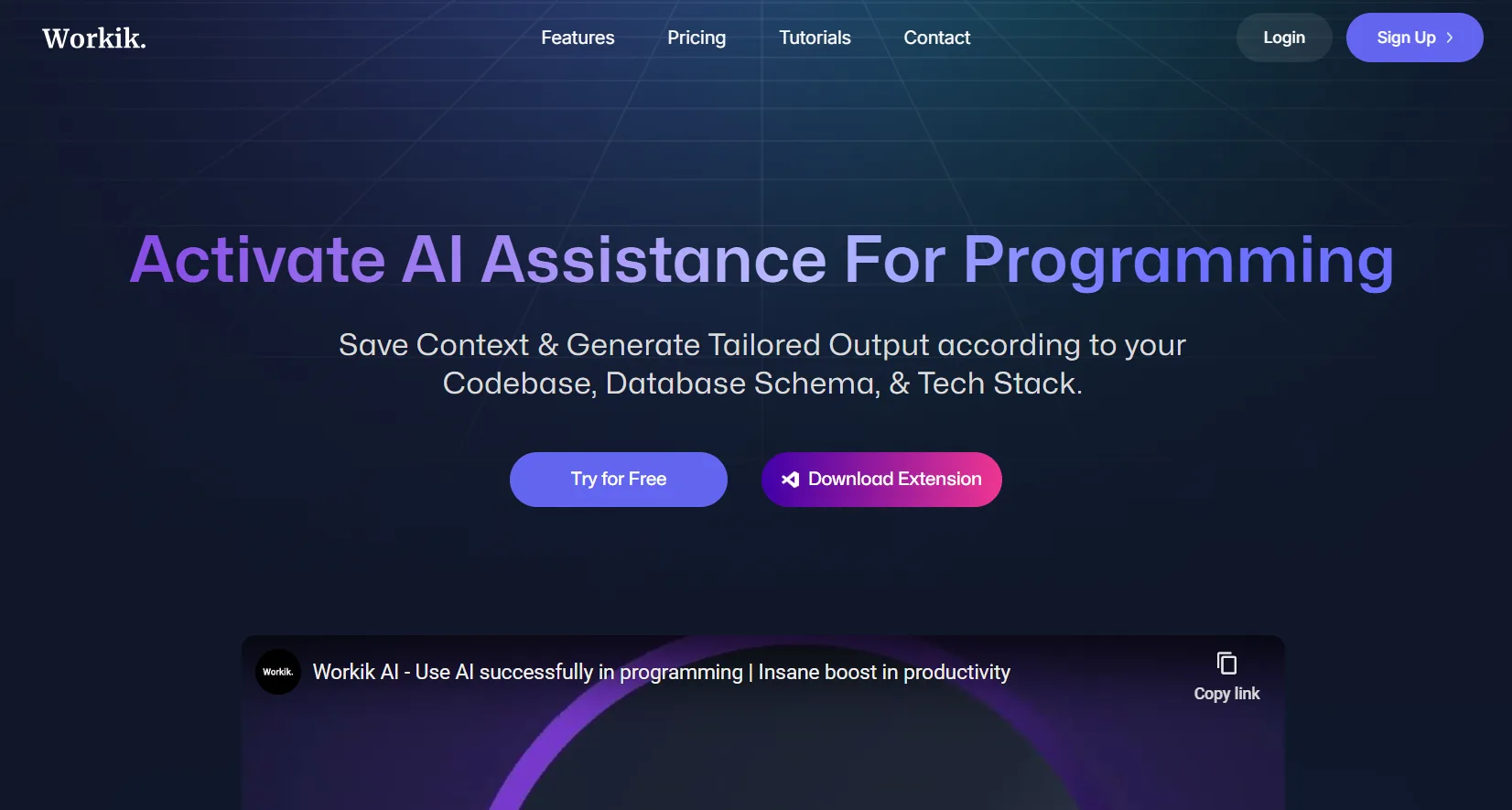
- Purpose: Automates error monitoring and performance optimization for Python, JavaScript, and other languages, ideal for web developers and data scientists.
- Key Features:
- Real-time error detection for syntax and runtime issues.
- Performance profiling for memory leaks and bottlenecks.
- Collaborative debugging workspaces for team projects.
- Integration with GitHub, GitLab, and CI/CD pipelines.
- Benefits: Speeds up debugging by pinpointing errors with plain-language explanations, improving code quality and team collaboration.
- Ease of Use: Intuitive interface with minimal setup; ideal for beginners and experts. Workik AI
- Integration: Supports VS Code, PyCharm, and frameworks like Django, Flask, and TensorFlow.
- Pricing Model: Freemium with premium plans for advanced features.
- Real-World Application: A Nigerian startup uses Workik AI to debug a Flask-based e-commerce platform, resolving API errors in real time to meet a tight launch deadline.
- Pros:
- Context-aware suggestions enhance accuracy.
- Strong collaboration features for remote teams.
- Free tier suitable for startups.
- Cons:
- Advanced features require a paid plan.
- Limited support for less common languages.
“Workik AI has cut our debugging time by 40%, letting us focus on building features.” – Sarah Adebayo, QA Engineer at CodeWave Nigeria.
2. DebuGPT
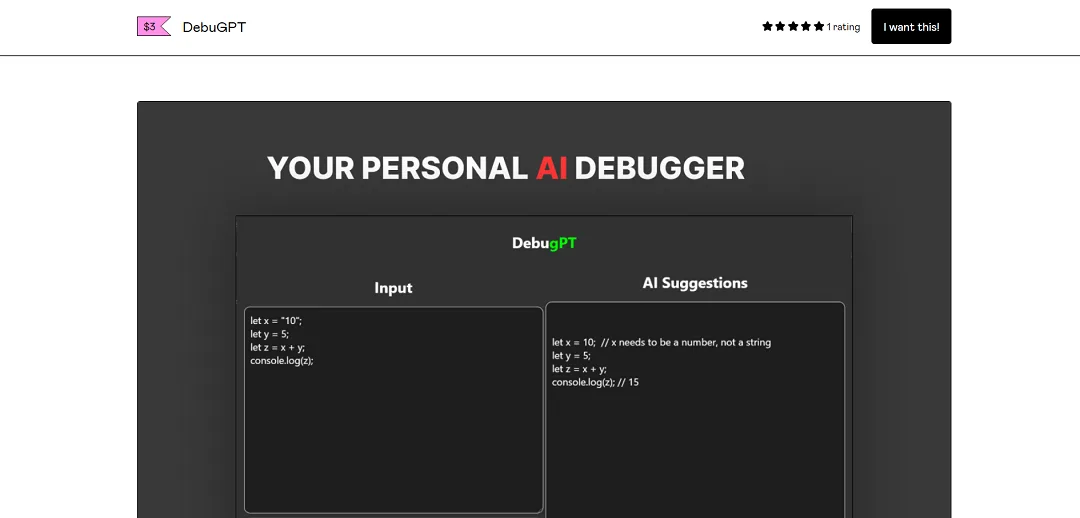
- Purpose: Provides real-time code error solutions for developers across languages, enhancing productivity in complex projects.
- Key Features:
- Continuous bug monitoring with instant flagging.
- AI-driven fix recommendations based on best practices.
- Contextual insights tailored to your codebase.
- Benefits: Reduces production errors by catching bugs during coding, saving time for developers under tight deadlines.
- Ease of Use: Seamless IDE integration but requires a learning curve for advanced features.
- Integration: Compatible with VS Code, IntelliJ IDEA, and Eclipse. DebuGPT
- Pricing Model: Subscription-based with a free trial.
- Real-World Application: A DevOps engineer uses DebuGPT to debug a microservices architecture, identifying inter-service communication issues in real time.
- Pros:
- Proactive bug detection.
- Highly relevant fix suggestions.
- Cons:
- Subscription cost may deter small teams.
- Effectiveness varies with codebase complexity.
3. DebuggAI
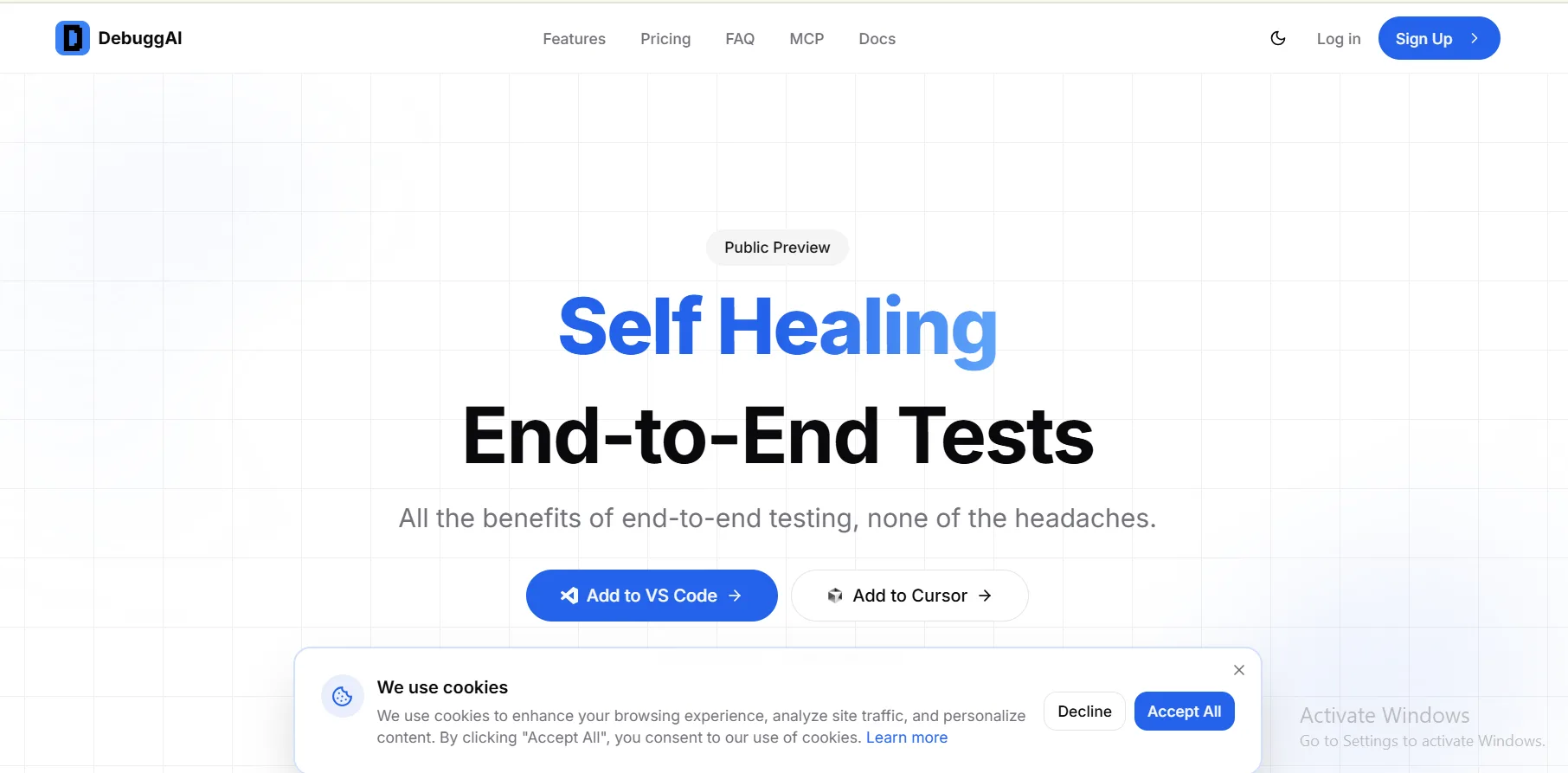
- Purpose: Simplifies real-time debugging for web and game developers with AI-driven test generation and error tracking.
- Key Features:
- Automatic test generation in plain English (e.g., “Test my login flow”).
- In-IDE test results with GIF recordings.
- Secure tunnels for localhost testing.
- Benefits: Eliminates flaky tests and reduces testing overhead by 90%, ideal for fast-paced development.
- Ease of Use: Plug-and-play VS Code extension with no configuration needed.
- Integration: Works with VS Code and local servers. DebuggAI
- Pricing Model: Freemium with tiered plans for organizations.
- Real-World Application: A game developer uses DebuggAI to test a login flow in a multiplayer game, catching UI bugs before deployment.
- Pros:
- Intuitive for non-technical users.
- Excellent for end-to-end testing.
- Cons:
- Limited to web and game development.
- Advanced features locked behind paywall.
“DebuggAI’s plain-English testing is a lifesaver for our team, cutting test setup time dramatically.” – Tolu Adeyemi, Game Developer at PlayStack Studios.
4. AskCodi
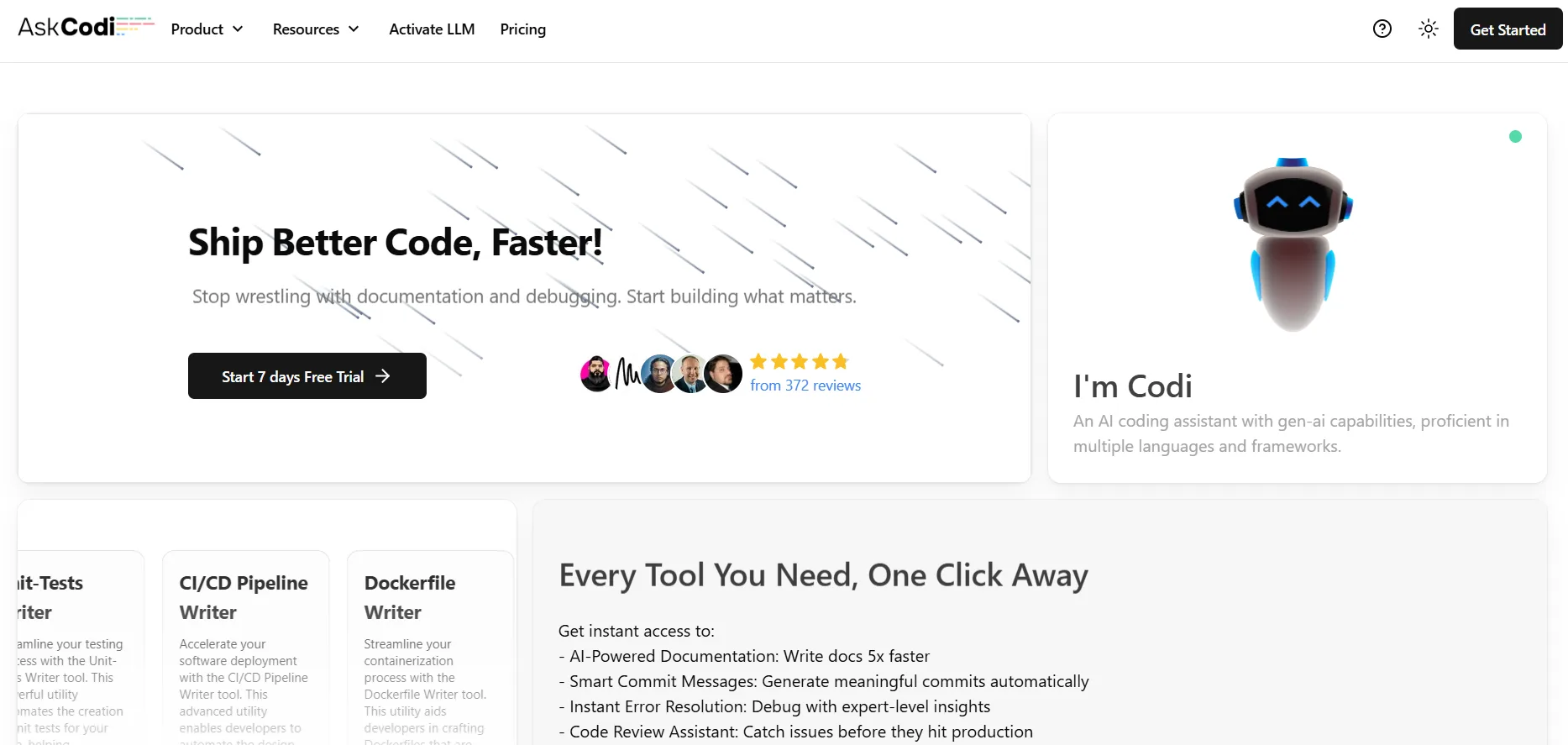
- Purpose: Offers intelligent code completions and error monitoring for developers working in multiple languages.
- Key Features:
- Context-aware code suggestions.
- Debugging assistance with error explanations.
- Multi-language support (Python, JavaScript, Java, etc.).
- Benefits: Accelerates coding and debugging with predictive suggestions, reducing errors in real time.
- Ease of Use: User-friendly but requires familiarity with IDE integrations.
- Integration: Supports VS Code, JetBrains, and Sublime Text. AskCodi
- Pricing Model: Freemium with premium upgrades.
- Real-World Application: A full-stack developer uses AskCodi to debug a Node.js backend, leveraging smart completions to fix API errors quickly.
- Pros:
- Broad language support.
- Enhances coding speed and accuracy.
- Cons:
- Less focus on advanced performance profiling.
- Premium features can be costly.
5. ZZZCode AI
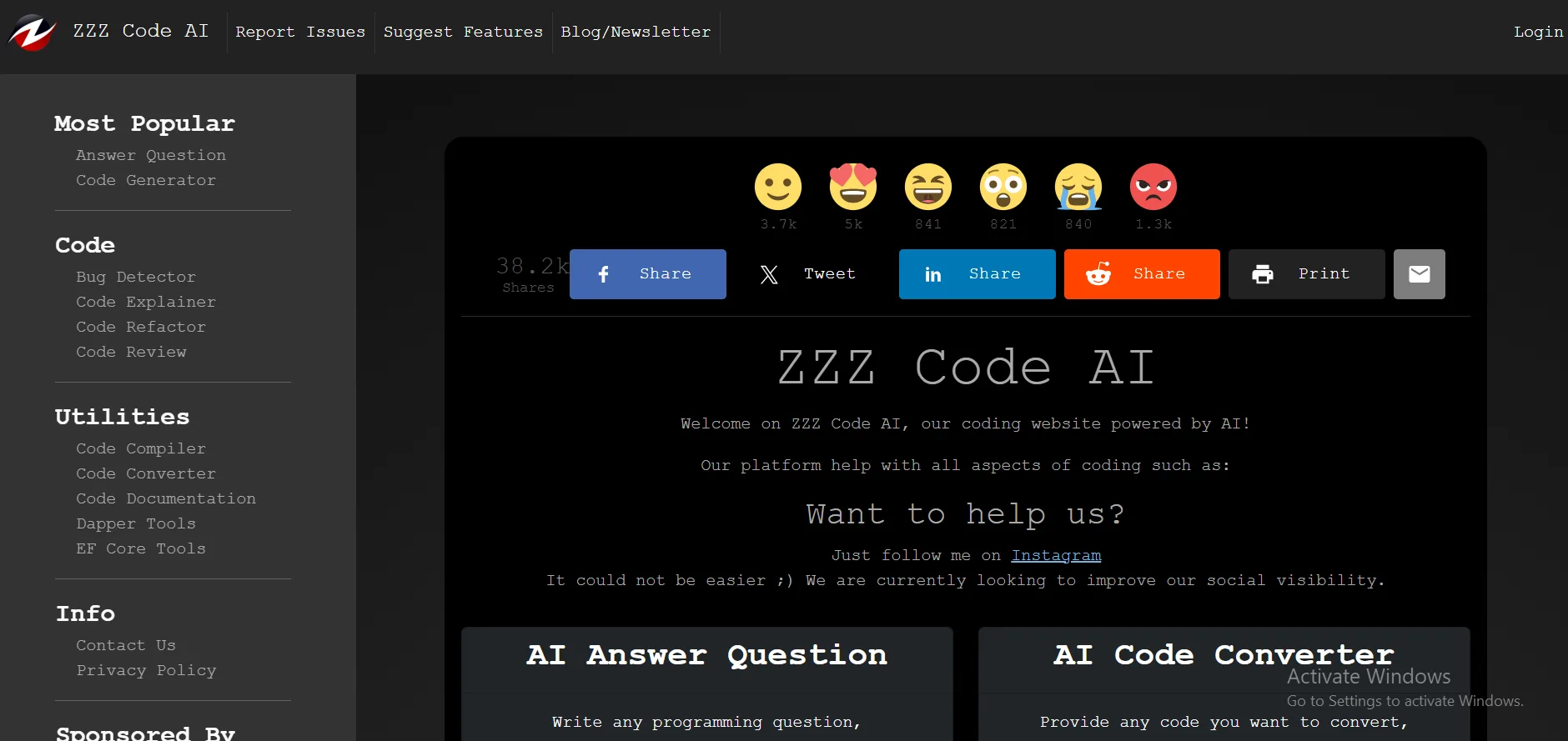
- Purpose: Provides free, online code error solutions for any programming language, ideal for quick debugging tasks.
- Key Features:
- Online code submission with instant feedback.
- Multi-language support with language-specific suggestions.
- Plain-language error explanations.
- Benefits: Accessible and cost-free, perfect for startups and solo developers on a budget.
- Ease of Use: Simple web interface with no setup required.
- Integration: Web-based; no direct IDE integration. ZZZCode AI
- Pricing Model: Completely free.
- Real-World Application: A freelance developer uses ZZZCode AI to debug a PHP script, receiving clear feedback to resolve a syntax error instantly.
- Pros:
- Free and accessible.
- Supports all languages.
- Cons:
- Lacks advanced features like performance profiling.
- No collaborative tools.
“For quick fixes on a budget, ZZZCode AI is unbeatable—it’s like having a free debugging mentor.” – Chidi Okonkwo, Freelance Developer.
AI Tool Comparison
The following tables compare the five AI-powered debugging tools based on key criteria to help professionals choose the right solution.
Table 1: Feature Comparison
| Tool | Real-Time Detection | Performance Profiling | Collaboration Features | Multi-Language Support | IDE Integration |
|---|---|---|---|---|---|
| Workik AI | Yes | Yes | Yes | Yes | VS Code, PyCharm |
| DebuGPT | Yes | Limited | No | Yes | VS Code, IntelliJ |
| DebuggAI | Yes | Yes | Yes | Limited | VS Code |
| AskCodi | Yes | No | No | Yes | VS Code, JetBrains |
| ZZZCode AI | Yes | No | No | Yes | None (Web-based) |
Table 2: Pricing and Suitability
| Tool | Pricing Model | Best For | Ease of Use | Cost-Effectiveness |
|---|---|---|---|---|
| Workik AI | Freemium | Web developers, Data scientists | High | High (Free tier) |
| DebuGPT | Subscription | DevOps, Enterprise developers | Moderate | Moderate |
| DebuggAI | Freemium | Game developers, Web testers | High | High (Free tier) |
| AskCodi | Freemium | Full-stack developers | Moderate | Moderate |
| ZZZCode AI | Free | Freelancers, Startups | Very High | Very High |
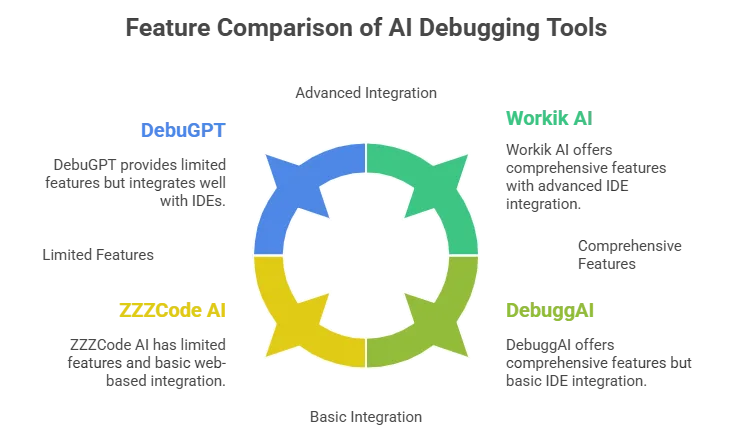
Ethical Considerations & Best Practices
Using AI-powered debugging tools raises ethical considerations, particularly around data privacy and over-reliance. Many tools process code snippets in the cloud, so professionals must ensure sensitive data (e.g., proprietary algorithms) is not exposed. Always review the tool’s privacy policy and opt for solutions with robust encryption, like Workik AI or DebuggAI. Additionally, avoid over-dependence on AI suggestions—validate fixes manually to maintain code integrity. Best practices include:
- Regularly update tools to leverage the latest AI models.
- Combine AI debugging with traditional methods (e.g., unit testing) for comprehensive error tracking.
- Train teams on tool usage to maximize adoption and efficiency.
“Ethical AI use in debugging means balancing automation with human oversight to ensure code quality and security.” – Dr. Amina Yusuf, AI Ethics Researcher.
Empower Your Workflow with AI Debugging
Error tracking with AI debugging assistants is transforming how professionals tackle code errors, offering real-time, context-aware solutions that save time and enhance code quality. By integrating tools like Workik AI, DebuGPT, or ZZZCode AI, developers, QA engineers, and DevOps professionals can streamline workflows, meet deadlines, and deliver robust applications. Explore these tools today to revolutionize your debugging process and stay ahead in the fast-paced world of software development.
Frequently Asked Questions (FAQs)
What is error tracking with AI debugging assistants?
Error tracking with AI debugging assistants involves using AI to automatically detect, diagnose, and suggest fixes for code errors in real time, streamlining the debugging process.
How do AI debugging tools improve developer productivity?
These tools provide real-time error detection and context-aware fix suggestions, reducing manual debugging time and enabling developers to focus on feature development.
Are AI debugging tools suitable for startups?
Yes, tools like ZZZCode AI and Workik AI offer free or freemium plans, making them cost-effective for startups and SMEs with limited budgets.
Can AI debugging tools handle complex codebases?
Advanced tools like Workik AI and DebuGPT excel in complex projects, offering performance profiling and concurrency issue resolution for large codebases.
What are the risks of using AI debugging tools?
Risks include potential data privacy issues and over-reliance on AI suggestions, which can be mitigated by choosing secure tools and validating fixes manually.






